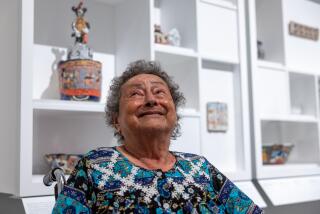Artworks tell stories of immigration
- Share via
CHICAGO -- A window washer dressed as Spider-Man scales a building. A nanny clad as Catwoman attends to children. A pizza delivery man wearing Superman garb rides a bike with pies in the basket.
The humorous photographs by Mexican artist Dulce Pinzon depict real immigrant workers in their everyday jobs. But the images also proclaim them as superheroes who work grueling hours to make a better life for their families.
It’s an idea linked to the immigrant experience in the United States and one that echoes throughout a new exhibit at the National Museum of Mexican Art in Chicago.
The collection, called “A Declaration of Immigration,” is designed to challenge U.S. immigration policies and call attention to unsuccessful attempts at reform, according to the museum’s president Carlos Tortolero.
“Immigration affects the whole world,” he said. “Immigrants are human beings who live in this country and contribute to this country. To be pro-America, you have to be pro-immigrant.”
The nearly 100 paintings, photographs, sculptures, quilts and artifacts run the range of the immigrant experience.
Quilts tell the story of Hmong immigrants from Laos. Photographs show a Korean family’s appreciation of Elvis Presley and soccer. A retablo, or lamina, of carved figurines depicts the harrowing journeys some immigrants make to arrive in the United States.
Tortolero got the idea for the exhibit about two years ago when Congress approved a fence along the U.S. border with Mexico. He said he was disturbed that both presidential candidates Sens. John McCain and Barack Obama voted for the fence. So he sees the exhibit as a way to open a discussion about immigration reform.
A large sign at the entrance of the exhibit mimics the U.S. Declaration of Independence, proclaiming that the country is “a nation of immigrants.” It also says that “the construction of the wall along the United States-Mexico border would stand as a symbol of persecution, much like the 20th century Berlin Wall.”
Several pieces criticize the Department of Homeland Security.
The exhibit also reflects the lighter side of immigrant life.
One installation, called “Phone Home” by Mario Ybarra, is a glass case full of colorful international calling cards. Another piece by Alejandro Diaz shows a series of facetious handwritten signs. One reads: “No Mexicans/No Tacos/You Better Think Twice America.”
The exhibit runs through Sept. 7 and will not travel.
More to Read
The biggest entertainment stories
Get our big stories about Hollywood, film, television, music, arts, culture and more right in your inbox as soon as they publish.
You may occasionally receive promotional content from the Los Angeles Times.










